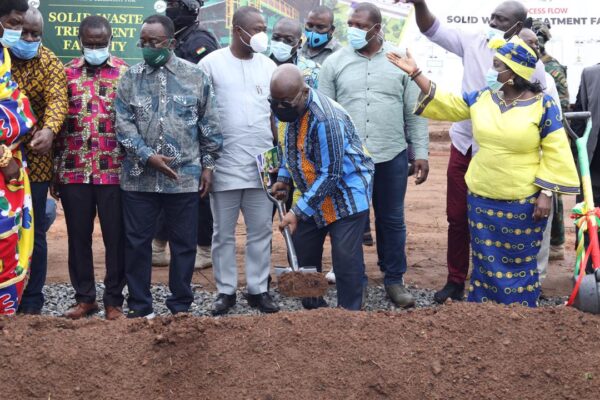
President Nana Addo Danquah Akufo-Addo, has cut sod for the construction of a solid waste treatment plant at Fiaso in the Techiman South Municipality within the Bono East Region.
The sod cutting ceremony which forms part of the President’s two-day tour in the Bono East Region was done together with the Minister of Sanitation and Water Resources (MSWR)- Cecilia Abena Dapaah, the Bono East Regional Minister-Kofi Amoakohene and the Paramount Chief of Techiman Traditional Area-Oseadoyo Akumfi Ameyaw IV.
The 15-million Euro project, which is expected to be completed within four months, is under a partnership of Zoomlion Ghana Limited (ZGL) and its private sector partners and the Ministry of Sanitation and Water Resources.
Read also: Coordinating Directors urge govt to support Zoomlion
Speaking at the event, the Sanitation Minister, Cecilia Dapaah, said the president is heavily investing in addressing the sanitation challenges of the country as part of his vision of making Ghana one of the cleanness country in the sub-region.
These investments will help address the heaps of rubbish and poor sanitation within our society,” she emphasised.
On his part, the Chairman of the Jospong Group, Dr. Joseph Siaw-Adjepong, noted that the project when completed will employ 75 people directly and 250 people indirectly, majority of which will be locals.
He mentioned that the Bono East project is the third in the country that have witness commencement of work adding that the company plans to established similar plants in all the 16 regions.
With the President performing the sod-cutting ceremony, we are starting the construction immediately. All the machines are ready to facilitate the project,” he said.
The 15 million Euro project, which is situated on a 100-acre land is expected to be completed within four months, will process solid waste from eight districts within the region into fertilizer. This will greatly impact the farming activities of the region since the region produces more than half of the country’s food crops.
Apart from addressing the sanitation challenges of the region, the availability and the relatively affordability of the fertilizer would positively impact on the country’s import bill with the reduction of the importation of fertilizer.
When completed, the plant will have facilities including plastic waste recycling, finished products and spare parts, compost workshop, sorting workshop and an office building. The rest are restaurant, weighing bridge, recycling plant, washing bay, skills training scavengers, clinic and a laboratory.

